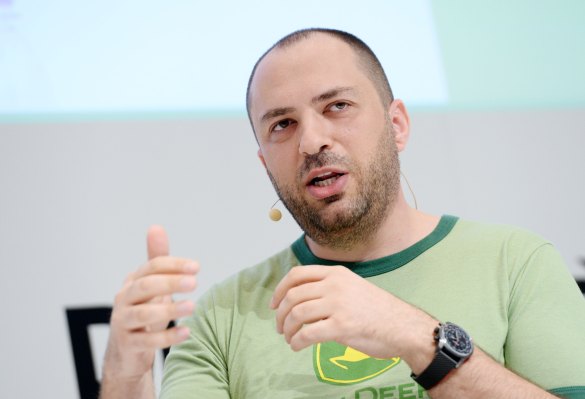Departing WhatsApp CEO Jan Koum is ditching Facebook’s board and nearly $1 billion in unvested stock. After announcing his exit from Facebook yesterday, the parent company filed an SEC document stating that Koum will not stand for re-election to Facebook’s board of directors. That confirms the Washington Post‘s report that Koum would exit Facebook’s board.
According to SEC documents filed at the time of WhatsApp’s acquisition by Facebook in 2014 specify a four-year vesting schedule, with vesting dates on February 15th, May 15th, August 15th and November 15. Leaving now would mean Koum would miss his last three vesting milestones. Bloomberg calculates that Koum will be missing out on 5.8 million shares, currently worth around $997.5 million. That’s a steep cost for freedom.
“On April 30, 2018, in connection with his resignation from his position as Chief Executive Officer of WhatsApp Inc., Jan Koum informed Facebook, Inc. (the “Company”) that he will not stand for re-election to the Board of Directors of the Company at the Company’s 2018 Annual Meeting of Stockholders (the “2018 Annual Meeting”). The Company will file a supplement to its proxy statement for the 2018 Annual Meeting to reflect the changes described in this Current Report on Form 8-K.”
Facebook’s remaining board members are CEO Mark Zuckerberg, COO Sheryl Sandberg, Andreessen Horowitz’s Marc Andreessen, Founders Fund’s Peter Thiel, General Catalyst’s Kenneth I. Chenault, University of North Carolina’s Erskine B. Bowles, University of California – San Francisco’s Susan D. Desmond-Hellmann, and Netflix’s Reed Hastings.
Now the question turns to Koum’s successor. Facebook’s board will be able to select a replacement for Koum’s seat. As for the WhatsApp CEO title, the role might go to a long-time WhatsApp employee who was there since before Facebook acquired the company in 2014. A strong candidate is Neeraj Arora, who a source described as WhatsApp’s #4 in command.
It seems unlikely that Facebook will try to formally roll WhatsApp under David Marcus, who leads the Facebook Messenger division. Keeping the brands separate, as Facebook does with Instagram, has long been a company strategy. It gives people less of a feeling like they’re using a product from a domineering empire, and limits the spread of backlash if there’s a big problem at one of the subsidiaries.
